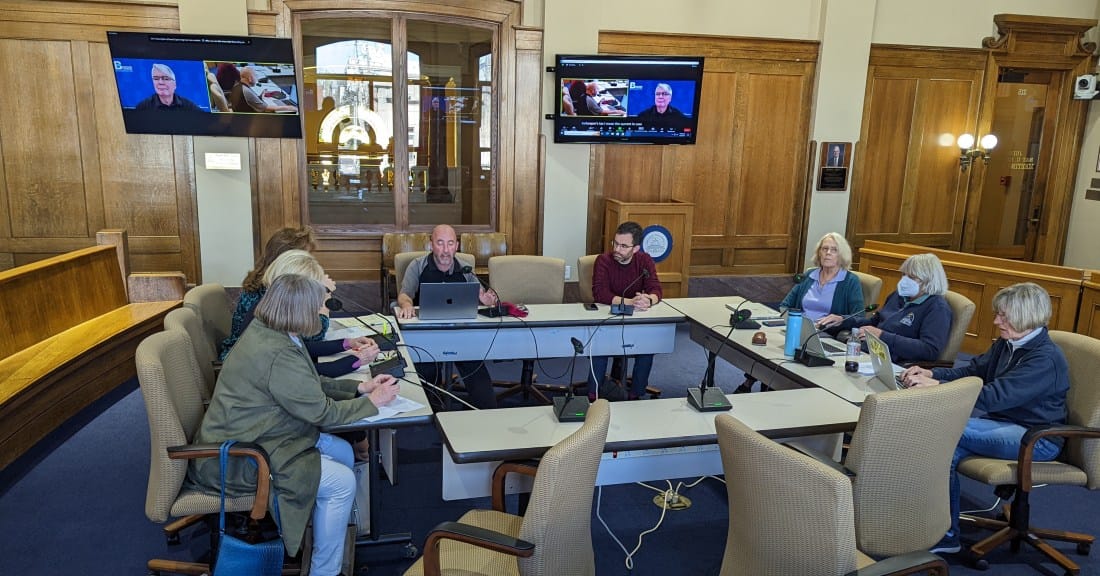Column: For convention center governance, it’s a clear choice—the one subject to the Open Door Law


City and county officials met on Wednesday at the county courthouse to discuss a possible path forward towards expansion of the Monroe Convention Center.
In his public commentary at the meeting, Greater Bloomington Chamber of Commerce president Eric Spoonmore called the meeting “some of the most substantive progress that we’ve made on this expansion in six years.”
Spoonmore added, “Whether the final outcome is through [a CIB (capital improvement board)], or whether it’s through a 501(c)(3), either option is fine with us.”
Spoonmore mentioned the two governance options, because those are the two choices under discussion. County commissioners want the governance of the expanded convention center to take the form of a CIB, which is a public entity.
In fact, on Wednesday morning at their regular meeting, county commissioners approved an ordinance to form a CIB upon the “commissioners’ receipt of the City of Bloomington Mayor and Common Council’s agreement with the terms of this Ordinance.”
The city of Bloomington wants the governance to be handled as a private 501(c)(3).
I think this is an easy choice, based purely on consideration of Indiana’s Open Door Law (ODL) and the Access to Public Records Act (APRA).
A CIB is subject to those two statutes, which protect the public’s right to attend meetings and to get copies of the records that members of a CIB create or use in their deliberations.
A 501(c)(3) is not subject to either the ODL or the APRA.
A document provided to Bloomington city councilmembers by the mayor’s office includes an assurance that the work of a 501(c)(3) could still be made visible to the public: “A 501(c)(3) structure would still be transparent and accountable.”
The statement continues: “Annual fiscal review and public meeting requirements are both easily incorporated into a 501(c)(3)’s permanently binding governing documents.”
The city’s position was echoed at Wednesday’s meeting by Bloomington mayor John Hamilton, who joined the meeting via Zoom and appeared onscreen in the Nat U. Hill room. Hamilton said, “I do want—the canard about a 501(c)(3) not being transparent and not open. It can be structured—it is completely flexible.”
It’s not a canard.
It’s a simple legal fact that a 501(c)(3) is not subject to the ODL or the APRA.
County councilor Geoff McKim got it right at Wednesday’s meeting when he said, “Yes, some of the transparency and reporting requirements can be built into the bylaws of a private corporation. But what’s the remedy for the public if those requirements are violated?”
The remedy for the public, if the governance structure for the convention center is a CIB, would be crystal clear. Anyone has standing to file a lawsuit, if the CIB were to violate the Open Door Law. The law puts it like this (emphasis added): “An action may be filed by any person in any court of competent jurisdiction…”
It’s the threat that anyone at all could file a lawsuit that helps give the Open Door Law some teeth. The fact that anyone has standing to take a public body to court helps ensure compliance with the law. The law requires that members of the public get notified that meetings will be taking place and that they be allowed to attend, observe, and record the meetings.
Even if a 501(c)(3) were to incorporate features of the Open Door Law in its bylaws, if those bylaws were broken, not just anyone could bring a lawsuit to compel compliance.
For that reason alone, I don’t think the idea of forming a 501(c)(3) is the right approach for the governance of the convention center.
In other jurisdictions, like Terre Haute, a CIB is a proven model for governance of a convention center.
If the city council and the mayor’s office want to count themselves as supporters of a transparent approach to governance, they should support the formation of a CIB.




Comments ()